I’m interested in what parents and non-parents have to say and particularly what helpful advice adoptees may have to offer.
What would/did you do?
Our conversation started when Tessa, 9, asked me what bitch means and if it’s a bad word. We’ve had this talk before. I told her that the dictionary meaning is a female dog but that some people have also made it into a hurtful word meant to show extreme disrespect. If the word is used as a weapon, then yes, it is a bad word.
I was ready for all that. But not for the next part.
“Mommy, what does bastard mean? Is it a bad word?”
Bitch was easy. Except for, perhaps, people with extreme allergies or hatred of dogs, its denotation is uncharged. But bastard is different. Its dictionary meaning is, itself, a highly charged slur against adopted people.
How would/did you respond? Given the luxury of contemplation and preparation, what is your best response?
I distracted with something shiny. So I’ll be taking your advice into consideration when the conversation comes up again.

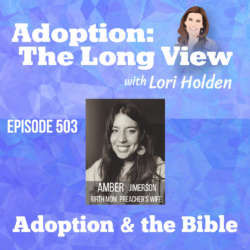
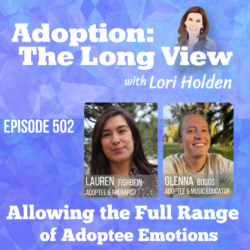
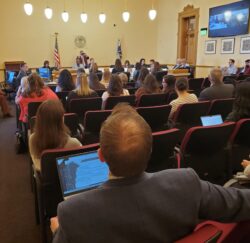
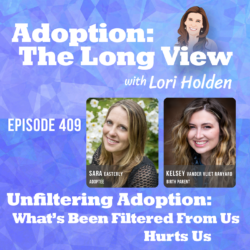

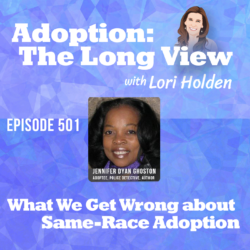

39 Responses
Oh my goodness, I don’t know. I have such a tough time with these things. I tend to just tell them what it is and I don’t know if that will change as they grow. I hope not, because I want to be honest and open. The world will hurt them, words and friends might too, but if it’s coming from me and told with the knowledge of being their parent and with no malice, I think the best thing to do is first give her the dictionary meaning, explain it and then tell her what she might hear from other people, how others will use that word, what it means to your family and why.
Lori, ,my advice will never come close to the way you will do this. You are an incredible mom and person. Your words and feelings will go a long way to make this an educational moment. One where Tessa learns that she is in control of the words around her and her mom is a true protector of those words.
love to you.
I’m of two minds on this on the one hand I would say that just because you started out the first explanation with the dictionary definition doesn’t mean you have to for the second. When asked what bastard means you can say that since the term “bitch” is usually reserved to be mean to females people sometimes use the word “bastard” as it’s male counterpart both words are hateful words and used to make people feel badly.
On the other hand, the definition will eventually come to light. You know your daughter best and hopefully you will be able to gauge if when the question comes up again is the right time to have that conversation.
Good luck 🙂
Helpful takeaway: There’s no law that says I have to go denotation/connotation for both bitch and bastard.
Thanks, KatjaMichelle!
I would just say that back in the olden days when unmarried people were not allowed to live together, it was a rude word that described a child born to them- but now it’s used to mean a jerky guy.
Excellent in its simplicity. Thank you, Mrs Spock.
Oh Lori, your daughter knows how to ask ’em, doesn’t she??
I agree with both sentiments above – a) you’re amazing and will come up with something that will be right for your daughter and b) you don’t have to explain the word with the same reasoning as you did with bitch.
That said, my inclination would be to put the original meaning of bastard out there before she learns it on the school bus or wherever.
The fact that the word has become the male equivalent of bitch should make sense to her. . And I wouldn’t be too surprised if kids of this generation take the other meaning in stride as “an old timey” meaning, since I’m sure they all know at least a handful of children, whether adopted or not, who were born out of wedlock.
Maybe I’m being too optimistic, but it really appears to me that parenthood and marriage are becoming two separate things.
Helpful takeaway: be the one to tell about the dictionary meaning.
I so appreciate this, Michelle!
As always, your readers are as wise as you, so the advice they’ve given so far is wonderful.
My only addition would be to remind you that sometimes by leaving things unsaid we make them into something more than they are. By not answering her question directly, what did you imply?
Yes, the word bastard means someone born out of wedlock. And, yes, it was considered negative in its day (and, today, depending on your values/culture) – but when people use the term today they do mostly mean a terrible person, and generally they aren’t making the connection to its dictionary definition. But there are many, many things in this world that were considered wrong or immoral or inappropriate once upon a time that are now generally accepted. (Women wearing pants? Oh, my! Women voting or owning property? The horror!!)
My guess is that Tessa knows – or knows of – many single parent families and doesn’t think twice about whether or not the “mommy and daddy” were married when the child was born – and even more to the point, she most likely knows children with same-gender parents… So I would ask yourself what was going on inside yourself that made you shy away from a discussion about how cultural views change over times, and what your family thinks about parenting out of wedlock. Someday Tessa might decide to be a single parent, right? And we all know you won’t think of that grandchild as a bastard…(in either sense of the word!).
Did she hear the word because someone described HER that way? In that case, the conversation is about bullying more than it is about the semantics of the definition of bastard.
You get a “do-over” here – if you want it! Although I’m equally sure it won’t matter if you wait until the next time.
But, p.s., it’s not automatically a slur against adoptees…many, many adoptees are the offspring of a married couple! Sometimes a cigar is just a cigar, and sometimes not everything is an adoption issue, lol, as you well know.
Good counsel. And I wasn’t intending to avoid the question indefinitely, but, rather to wait until I felt better prepared. We have a long history of being open with each other, and I’m happy that she can ask me such things.
I did muddle through a little bit before I went to Shiny Things, and here’s why.
The word was not used to describe her. However, when I told her the dictionary meaning (because I had yet to ask the wise Internets), she then said, “Mommy, that means I’m a bastard, right?”
That’s when I gently moved to talking about piercing her ears.
I’m feeling much better about a do-over, thanks to all of you.
I like the option to distract with something shiny… it’s my personal favorite parenting technique!
That said, your post is timely, because Liam asked us this week what bitch meant too. And we gave the same definition… originally meant for dogs, now used as a mean word.
He hasn’t asked about bastard yet, but I would lean more towards it just being a bad word, the male counterpart to bitch. I guess because as an adoptee myself, I have never thought of myself as a bastard. To me, it’s not an “adoption” term, though I know that it is for many other adoptees.
Hang in there! You’re doing just fine.
Thank you, Andy.
Wow! That must have been one intense moment!
I think you value honesty with your children and think that you’ve received great advice here. I also think that you handle things with such care and thought, that you’ll do better at this than you currently thought.
The term has a hirstorical context, like mentioned before. It is also used ‘today’ as a word that sort of means ‘jerk’ for a guy. Which I’m sure you know all of this. I think explaining both of these situations is ok. Hit it, diffuse it, then it will rest. Leaving it…and it will fester.
BUT, I think what’s more important is to ask her where she heard/found these words? That might be an interesting conversation on its own.
Good luck! I’m sure you’ll do fine. 😉
I really like Mrs. Spock’s answer, as personally I do not associate that word with a child who was adopted. I defintiely relate it more to jerks, as others have said. However, that doesn’t mean that I don’t think your children should know at some point in their lives that other people may think that way and they may want to be prepared to hear it and deal with it if need be.
As for how I would handle it, I tend to be really open and honest, sometimes more than I probably should be, with my kids. I just try to remember to not go on and on or tell them more than they are truly looking for (which I have a tendancy to do). These hard questions are hard for a reason. I hope all these great comments will help you feel more confident in answering the next time a hard question like this is raised by one of your children. Thank you for sharing.
What a tough question. I had to giggle at distracting with something shiny though!
Really great comments everyone. Such great food for thought for a mom with a boy who only has a few words in his vocabulary so far. I am always very interested to think ahead about these things though. When reading all the posts, I wondered what you thought about the concept of our adopted children not being born out of wedlock? Our birth mother chose us before Sam was born. She was out of state, but we were with him within hours of his birth. My husband and I were married at the time. We are his parents. So, was he born out of wedlock? I guess I don’t think he was. I have a good friend who did have and unplanned pregnancy and had a child out of wedlock and that feels very different than our scenario to me. Not that there is anything wrong with being born out of wedlock in my opinion. And every adoption scenario is so different, but it just got me to thinking.
ps my first post on any blog ever – maybe I will leave my life of Write Mind Open Heart lurking 🙂
Go into the light, Caitlin! Thanks for popping your commenting cherry here 🙂
While growing up, I only remember my adoptive mother using that word when she was really angry with someone. Call me naive :), but for the longest time, I didn’t know the true definition and its negative connotation. It wasn’t until I found my birth family that I have felt that old-school mind-set and stigma of being the child born out of adultery. Through some people’s eyes adoption from infidelity seems to make it wrong to search. However, if I had wanted to find my absent adoptive father from divorce that would have somehow made it different. When I hear my fellow adoptees call themselves now such a derogatory term, it bothers me even as an adult. From my perspective, I believe Lori it’s better to keep it as real as possible with simple explanations for your daughter, Tessa. Sadly, our world will never change—derogatory words that cut deep are still and will always be spoken out of anger towards others.
I agree. Keeping it real is good. I am so glad you shared your perspective, JoAnne. I was wondering how the word sounds to some when used by adoptees to describe themselves, a take-back-the-word type thing.
They do know just what to ask, don’t they? Mine usually asks as I’m driving and need to concentrate. I’ll love to know what you said. I’m with Mrs. Spock: keeping it simple and addressing the fact that any word that is spoken in hate is a bad word. I think it’s also helpful to remind children that people who use that word in its true sense are ignorant of the wonderful blessings that adoption brings. They probably have never experienced adoption and they intend to hurt with something God intended to build families. I hope that makes sense. It makes sense in my head 🙂
Ouch.
Tessa’s question to you makes my stomach turn over, and I’m not her mother, so I can only imagine what it felt like for you at the time. No wonder you went to shiny distraction solutions 101!
Hugs to both of you.
Given the additional information as to what part of the conversation transpired, I’d answer her this way:
No. She is not a bastard. Her last name is legally the same as your last name, and in the eyes of the law, not only are you her legal guardian, you are married to her other legal guardian. (Double bonus!) In this instance, being the child of married parents is the definition of legitimate, which is the opposite of bastard. The old-time version of the word referred to people who would be left out of an inheritance because they couldn’t “prove” their lineage or weren’t bound to it legally.
Proponents of 17th Century Law would disagree with me, but that’s how I’d approach it. 😉
Good luck!
Very black and white, Casual Perfectionist, which is often just what is called for. Thanks!
I am behind in my reading and am just catching up. So many insightful responses to how to address your daughter’s pointed question. But, I suppose it is the question behind the question, her follow up question, that also give us pause.
I am an adult adoptee. My birth mother and father were not married (in fact it is likely that he was married to someone else). And, my adoptive mother divorced my first adoptive father and remarried when I was four. I distinctly remember learning the meaning of the word bastard and, at various points during my pre-teens/teen age years wondering if the word applied to me. I talked it through with an female adult I was close to at the time and for reasons along the same lines as what the Casual Perfectionist noted, rejected the idea that it applied to me.
My adoptive family was the ONLY family I knew. Family is family. My mom was married when I was adopted, then divorced and remarried, and I was readopted. I first had my birth name, then my first adopted name and then me re-adoption last name (and now my married name!). But all the while I felt “claimed” by my parents (claimed in the sense that I was wanted and belonged and cared for by loving adults, part of an invested and loving family) and I always somehow felt that a bastard, in the literal sense of the word, likely did not have or feel any of those things because of the shame that that word was meant to imply. And, I think that that is the crux of the matter…when there are loving/invested/committed parents (or, even caretakers) who instill a solid sense of self and belonging onto a child, there is no shame and without shame, there is no bastard.
Oh, boy, do I love this:
“when there are loving/invested/committed parents (or, even caretakers) who instill a solid sense of self and belonging onto a child, there is no shame and without shame, there is no bastard.”
Wow – Tessa really knows how to ask the questions! And the comments are excellent too. I agree – the dictionary definition of bastard is based on historical norms, and things change. It was relevant in terms of inheritance; it’s not so relevant now. It’s more currently used as a derogatory term semi-divorced from its original meaning. And while technically, she might have been the child of unmarried parents at one time, she is now the child of married parents. The subtleties of her situation defy labels.
Good luck, Lori – the questions only get harder from here!
I agree with mrs spock that I’d say what it used to mean in olden days but that now it is basically the male equivalent of a bitch.
Lots of good advice for you here already. I would just remind you that your experienced mind immediately jumps to the possible impacts of the definition as applied to adoption. But at her age, she’s most likely just looking for straight-up information. I’d say answer it as though she was the same as any kid, adopted or not. If her mind grasps the connotation, then answer her questions as they come, careful not to make more of it than it needs to be. Just my two cents worth.
GREAT comments. I’ll send a picture of my ex-husband if you need props.. 😉
I shouldn’t lol but I did!
OK…I was about to compose a serious response but I happened to read Melissa@Full Circle’s comment and I burst out laughing.
Jeez, when I asked my parents what bastard meant, they shhhed and told me it was a bad bad word.
I quickly went back to the dictionary I had and browsed for B, and then words that were Ba- and read the meaning.
I understood it that way.
I know that bastard is a horrible word and since Tessa is curious about it, she will eventually dig it out.
Is single parenting not a norm in the US? So many children are born out of the wedlock and are completely adored and accepted by the families…
You could tell Tessa the truth…say that just like bitch which is literally a female dog is sometimes used to hurt people, bastard is used in a hurtful manner for a lovechild or something like that.
I know she will ask you again.
I am a bastard. It is not a shameful or bad word.
When it is used in a derogatory manner to describe an awful, vile person, it is insulting to me and most adopted persons because most of us are bastards.
I would tell her it’s a label used for someone who doesn’t have a known father but it is not to be used.
Hello, Mara.
If she asked you why it was not to be used, how would you answer?
Thanks for chiming in. I appreciate your viewpoint.
I would be upfront and honest. A “bastard” was a term used to describe a child who was born to parents who weren’t married to each other. It is not a nice term because it assigns shame and blame to a child, and no child has any control over his/her beginnings. It is not a nice term, and we don’t use it. You can handle it the same way you handled the other word.
I remember asking my mom what circumcision was when I was 5 or so (I was an odd child). She gave me the dictionary definition (removal of the foreskin), and I walked away wondering why anyone was removing the skin of anyone’s forehead. lol I appreciated then and even more so now that she was always upfront with me, and even if your daughter doesn’t grasp the full meaning of the word and all of its social connotations, you can bet as she grows and learns more and has more questions she’ll continue to ask you because she knows you’ll be upfront and honest. 🙂
That scene from your childhood is an interesting visual!
I’m with Mrs. Spock!
Well, me being a foreigner I would start nice, on safe country:
One meaning of bastard is simply a hybrid, a cross, usually unintended by owners, between two or more breeds of animals, especially used in dogs. Such bastard dogs tend to be healthy and strong, but because they do not really belong to the dam’s breed or the sire’s breed, they are usually excluded from dog shows. You might even go into detail and tell her about people breeding such dogs on purpose for police work and the like, and that they are doing very fine.
(Positive/harmless meaning established, being a bastard is not intrinsically bad), now one could launch into marriage, different systems of law (knights and prncesses and all) and the born out of wedlock, the insulting value, even the use by adoptees. But start with cuddly puppies, and you have a good way to start. I mean what is the difference between a breed registry and a marriage registry to a child, after all?
that is exactly what I would say Mrs. Spoc
I too wonder why the question, whether it’s pure curiosity or whether someone (another child) said something to her. I haven’t read on to the next post yet, so I guess I’ll find out how your conversation unfolded! (Melissa@Full Circle cracked me up too!)